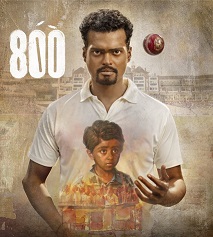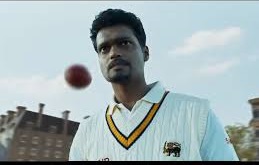|
|
||
|
Pro Tools
FILMFESTIVALS | 24/7 world wide coverageWelcome ! Enjoy the best of both worlds: Film & Festival News, exploring the best of the film festivals community. Launched in 1995, relentlessly connecting films to festivals, documenting and promoting festivals worldwide. Working on an upgrade soon. For collaboration, editorial contributions, or publicity, please send us an email here. User login |
800, Review: The numbers game
800, Review: The numbers game If you have not done your research already, you must be told that this film is about cricket, and, more specifically, about Mutthiah Muralitharan (also spelt Muralidaran), the SriLankan spin bowler who holds the record for taking the maximum number of wickets in Test match cricket – 800. And hence the name of the film. A biopic that dramatises and recreates his life, right from the time when he was a little kid, till the time when he retired from the game. Sadly, there are only a few interesting or novel tit-bits in an otherwise overblown documentary. Moreover, there is not a single shot of Murali or any of his contemporaries or any game he played, except those few that have been played by actors. Produced by a Tamil unit, the film raises the questions: why have they chosen a foreign cricketer and why have they made the documentary now, 13 years after he retired from the game? To cricket aficionados, his achievements are still fresh. They don’t need to be reminded. To the casual cricket buff, 800 might appear both a little too early or a little too late. The story captures the many facets of Muralidaran’s life, the son of a biscuit factory owner. He was born around the time when the Liberation Tigers of Tamil Eelam (LTTE) were fighting for an independent state, while the local SriLankans were venting their ire on the Tamil minority. In the 1870s, Indian Tamils from were brought to tea plantations by the British, when tea became the principal cash crop of Sri Lanka, and the British loved their tea. Until then, no tea was grown in SriLanka. Muralitharan grew up in this atmosphere. As a child prodigy, he impressed one and all. Though his parents were not cricket buffs, his grandmother loved the game, and gave him a lot of encouragement. After several rebuttals and conspiracies, Muralitharan made it to the SriLankan Test Cricket team. But it was tough going here too, because an Australian umpire found his bowling action illegal and repeatedly called his ball a ‘no ball’. Things came to such a head that he was not allowed to bowl. Later, he got himself checked with the International Cricket Council’s specialty doctors, who found that his arm action involved a curve of only 3° whereas some of his contemporary bowlers had a curve of up to 14°, before delivering the ball. In the case of Muralitharan, it appeared more than it actually was because of a minor deformity in his right arm, which he was born with. So, the accusation of ‘chucking’ or ‘throwing’ the ball was baseless. Yet, Muralitharan underwent an operation to correct the deformity. 800 reveals how Murali finds solace in cricket, stands up to bullies, and transforms from an excitable pace bowler into the highest wicket-taker in cricket’s history, as a spinner. It also dives deep into the issue of nationality versus humanity. Murali, being an ethnic Tamil, has to prove his commitment to the Lankan team and fans. It is a nationalist Sinhala reporter and his senior colleague who are the anchors in the film, with the young reporter hostile to the contributions of Muralitharan, and the senior a hard-core Muralitharan fan. But time and again, the film moves away from them and gets into its own stride. In one such instance, Muralitharan is invited by the Chief of the LTTE, Velupillai Prabhakaran, who orchestrated dozens of bomb blasts throughout SriLanka, for a meal, and the discussion gets political, with Muralitharan insisting that if it came to showing loyalty, he was a SriLankan first, and not a Tamil. However, Prabhakaran respects the heroism of Muralitharan, and he gets safe passage back home. A literary figure and the producer-director – Shehan Karunatilakahave and M.S. Sripathy - have collaborated non the script. One cannot judge the literary value because what one saw was a dubbed in Hindi version. There is not much of a story, except facts from Muralitharan’s life, all acted and dramatised. Incidentally, in the pre-opening credit titles, it is mentioned that the film is only inspired by true events and real personalities. Some of the facts were known to this reviewer. Of great value would have been the real footage involving Australian and English umpires and officials. Real white-skinned actors have been chosen to play those parts, and that is only as it should be. But they spoke with such heavy accents that very little was intelligible. In the fitness of things, these lines were neither dubbed nor sub-titled. Using the cub reporter v/s the senior reporter ploy did not work. And this was not for want of trying on the part of both the actors. It just seemed amateurish.
As director, Sripathy would have to choose an actor who looked like Muralitharan, but he has settled for someone who can bowl in Murali’s style, though he does not look very much like him. Your heart beats for the underdog, when he faces all the discrimination and bullying. Yet, you feel that it could not all be so bad because his father owns a biscuit factory. Sripathy succeeds in scenes like the one in which Murali is stopped by a uniformed man and asked to show his identity card, which he has forgotten at home, and, of course, the encounter with Prabhakaran. There is no detailed explanation of Murali’s bowling action, from his own point of view, or close-ups when he bowls, which would be icing on the cake. All the scenes in the newspaper office have been shot in one session, as is obvious. Some change in the banter between the two reporters, and a shift in location, would have made it more cinematically interesting. Sripathy must take full blame for a sound-track that threatens to smash your ear-drums to pulp, no matter what the scene. Amazingly, the makers have chosen a North Indian actor to play Muralitharan, Madhur Mittal (now 32; Slumdog Millionaire, Million Dollar Arm, Pocket Gangsters, Maatr). Earlier, superstar Vijay Sethupathi was tipped to play the role, but the controversy over Tamil and Sinhala sympathies kept him away. Madhur has earlier worked as a child star and is able to depict Murali at different ages in a nuanced performance. Narain as Velupillai Prabhakaran underplays, considering the ferocious reputation that the LTTE Supremo had. King Ratnam matches the looks as Arjuna Ranatunga, one of SriLanka’s top batsmen and Murali’s captain. The ever dependable and multifaceted Nassar, who is best known for his villain roles in Tamil epics, just walks through the role of the senior reporter. From Kasargod, Kerala, comes Mahima Nambiar as Madhimalar and Radhimalar (dual role), presenting a pleasant countenance. Vela Ramamoorthy plays Muttiah Muralitharan's father and does a good job. Other names in the cast roster are Vadivukkarasi, Riythvika, Sharath Lohithaswa, Vinod Sagar, Hari Krishnan, Rithvik and Dileepan. A better effort was expected from R. D. Rajasekhar, the cinematographer. Keeping a brisk pace overall is editor Praveen K. L. Although the background score is well composed, the sound editor or designer or director have got the better of Ghibran. You need good knowledge about cricket to understand this film. A cricket legend, a magician like Muttiah Muralidharan deserved better, much better. The film is not without humour, though. Unable to get permission or money to use the names of sponsors on hoardings (billboards) and other paraphernalia, on the cricket field, while replicating actual matches, the makers of 800 have used them nevertheless, but twisted their names. Singer becomes Singnr, Malaysia Airlines is Malaysi Airlines, and so on. Rating: * ½ Trailer: https://youtu.be/8jYz0CR6oYY 07.10.2023 | Siraj Syed's blog Cat. : Dileepan Ghibran Hari Krishnan International Cricket Council King Ratnam LTTE M.S. Sripathy Madhur Mittal Mahima Nambiar Murali Muralidaran Mutthaiah Muralitharan Narain Nassar Praveen K. L. R. D. Rajasekhar Rithvik Riythvika Sharath Lohithaswa Shehan Karunatilakahave Vadivukkarasi Vela Ramamoorthy Velupillai Prabhakaran Vinod Sagar
|
LinksThe Bulletin Board > The Bulletin Board Blog Following News Interview with EFM (Berlin) Director
Interview with IFTA Chairman (AFM)
Interview with Cannes Marche du Film Director
Filmfestivals.com dailies live coverage from > Live from India
Useful links for the indies: > Big files transfer
+ SUBSCRIBE to the weekly Newsletter Deals+ Special offers and discounts from filmfestivals.com Selected fun offers
> Bonus Casino
User imagesAbout Siraj Syed Syed Siraj Syed Siraj (Siraj Associates) Siraj Syed is a film-critic since 1970 and a Former President of the Freelance Film Journalists' Combine of India.He is the India Correspondent of FilmFestivals.com and a member of FIPRESCI, the international Federation of Film Critics, Munich, GermanySiraj Syed has contributed over 1,015 articles on cinema, international film festivals, conventions, exhibitions, etc., most recently, at IFFI (Goa), MIFF (Mumbai), MFF/MAMI (Mumbai) and CommunicAsia (Singapore). He often edits film festival daily bulletins.He is also an actor and a dubbing artiste. Further, he has been teaching media, acting and dubbing at over 30 institutes in India and Singapore, since 1984.View my profile Send me a message The EditorUser contributions |





























